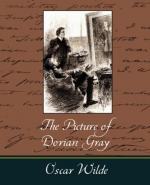have survived contact with Western civilizations, and
loved to touch and try them. He had the mysterious
juruparis of the Rio Negro Indians, that women are
not allowed to look at, and that even youths may not
see till they have been subjected to fasting and scourging,
and the earthen jars of the Peruvians that have the
shrill cries of birds, and flutes of human bones such
as Alfonso de Ovalle heard in Chili, and the sonorous
green stones that are found near Cuzco and give forth
a note of singular sweetness. He had painted
gourds filled with pebbles that rattled when they
were shaken; the long clarin of the Mexicans, into
which the performer does not blow, but through which
he inhales the air; the harsh ture of the Amazon tribes,
that is sounded by the sentinels who sit all day long
in trees, and that can be heard, it is said, at a
distance of three leagues; the teponaztli, that [70]
has two vibrating tongues of wood, and is beaten with
sticks that are smeared with an elastic gum obtained
from the milky juice of plants; the yotl-bells of the
Aztecs, that are hung in clusters like grapes; and
a huge cylindrical drum, covered with the skins of
great serpents, like the one that Bernal Diaz saw
when he went with Cortes into the Mexican temple, and
of whose doleful sound he has left us so vivid a description.
The fantastic character of these instruments fascinated
him, and he felt a curious delight in the thought
that Art, like Nature, has her monsters, things of
bestial shape and with hideous voices. Yet,
after some time, he wearied of them, and would sit
in his box at the Opera, either alone or with Lord
Henry, listening in rapt pleasure to “Tannhauser,”
and seeing in that great work of art a presentation
of the tragedy of his own soul.
On another occasion he took up the study of jewels,
and appeared at a costume ball as Anne de Joyeuse,
Admiral of France, in a dress covered with five hundred
and sixty pearls. He would often spend a whole
day settling and resettling in their cases the various
stones that he had collected, such as the olive-green
chrysoberyl that turns red by lamplight, the cymophane
with its wire-like line of silver, the pistachio-colored
peridot, rose-pink and wine-yellow topazes, carbuncles
of fiery scarlet with tremulous four-rayed stars, flame-red
cinnamon-stones, orange and violet spinels, and amethysts
with their alternate layers of ruby and sapphire.
He loved the red gold of the sunstone, and the moonstone’s
pearly whiteness, and the broken rainbow of the milky
opal. He procured from Amsterdam three emeralds
of extraordinary size and richness of color, and had
a turquoise de la vieille roche that was the envy
of all the connoisseurs.




